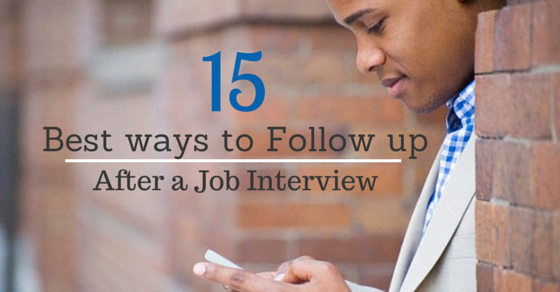There are a number of things that determine if you get the job or not, and these things do not end at the interview, instead some simple things that can be done after the interview can increase your chances of landing that job.
Post a job interview it is advisable to do a follow up in order to thank the company for considering you for an interview and also to know about your position/ results of the interview.
So before you do a follow up make sure to take some time to check if there is a minimum waiting period after the interview before you are allowed to contact the company again.
If so, then wait for that time before you contact them.
It is a good way of leaving a good impression and it will make an impact on you getting the job. It shows them you are pursuing the job aggressively, and will assert your interest in the job.
A good follow up message shows that you are passionate about the job at hand, and are really looking forward to getting the job.
15 Tips for Following Up After a Job Interview:
1. Do a follow up as soon as possible:
The early bird gets the worm. If you were in the interview with a lot of other people then it becomes easy to forget you.
Hence doing a follow up as soon as possible will help refresh the memories of the recruiter as to who you were and how you fared in your interview.
Now, before you do a follow up, make sure to take some time out to check out the submission guidelines.
Some companies discourage the candidates from contacting them after the interview, while some companies require you to wait a speculated time before you get in touch with them again.
If there is no such buffer time, you can contact them the very next day, offering your gratitude and asking for any information about your recruitment.
If you are really lucky the interviewer will message you about how you fared in the interview, but this rarely happens. If it does happen then you do not have to contact them again, as they will let you know if you got through or not, because you made such an impact on them.
2. Keep it brief:
Stay to the point. So not wander, and keep the mail short and concise. Remember, many others who would have faced the interview would also send a follow up, and the HR has to sift through them all.
If it is too long the HR might get bored or even annoyed with your follow up letter.
Ideally a follow up letter should end within three paragraphs, and each paragraph should have no more than 2- 3 sentences.
- In the first paragraph, you will thank them for taking their time off to consider you for the interview, and to show your gratitude. You will also mention your interest in the job in the same paragraph.
- The second paragraph should contain a list of your strengths and how the company will benefit from hiring you. it should not seem like you are bragging about it, rather it should seem like you are just stating the facts. The best way to do this is to break up the content into short bullet points.
- The third paragraph should include a set of clarifications you might have. You can add any information you might have left out previously in the interview, or any skill you haven’t mentioned before.
Remember to thank them again, and give them a time frame you expect to hear from them. But do not make it sound too obvious or desperate.
Something like “I appreciate you taking your time to go through this, hope to hearing from you in a couple of weeks” should do. It lets the HR know when you’d like to hear from them all the while being polite.
3. Do not cheap out if you opt for hand written notes:
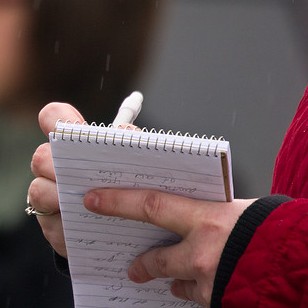 Hand written notes are a luxury, and are not used much, but a hand written note will peak a lot about your dedication to the job. However, a handwritten note is not advised if you have a bad handwriting.
Hand written notes are a luxury, and are not used much, but a hand written note will peak a lot about your dedication to the job. However, a handwritten note is not advised if you have a bad handwriting.
If you handwriting is less than impressive/ illegible you are better off just sending an email expressing your gratitude and doing a follow up.
Use a good quality pen and a good quality paper and envelop to write and send your follow up note. This shows you are serious and are very interested in the job. It shows your employers that you value time and have class.
Your attention to details will surely make you stand out from the rest. Practice and perfect your letter before you pen it down, and make sure to go all out for this.
4. Names are important! Do a double check:
Nothing is as worse as messing up names on a formal letter. It’s even worse if you do it on a follow up letter. Take some time of, to proof read your follow up letter before you send it.
Double check the names of the interviewers and the designations. Then check again just to be sure.
Even some of the most common names are spelled in different ways make sure you have spelled their names right. Even smaller spelling mistakes and grammatical errors present a wrong impression on you, making you seem careless and restless.
When you are sending it out, make sure that you use the right address, be it snail mail or through e-mail.
Any mistake in the address might lose your follow up letter, and you may never get a reply, frustrating you further.
This might make you doing impulsive things such as accusing the company of not getting back to you in real time or worse, it may even lower your chances of standing out from the crowd.
5. Only initiate contact through mails, and not phone:
Most interviews will end with the interviewer letting you know of when they might contact you. This time period is crucial, and you shouldn’t initiate any form of contact with the company.
If this is not mentioned, then you can let them know of this in your follow up email, and can even ask them when you can expect a call from them.
If you call them any time before the given time frame you will come off as desperate and clingy.
Also, make sure to never call them up on your own. Your correspondence must be only through mails. This will give them time to check up on your application and its status before updating you on the same.
Also give them some time to respond to your emails, and keep them brief and ensure to leave a respectable time gap between mails.
The HR’s are usually busy with other work as well, and it might take some time to track down the progress of your resume. This will give them an impression of you respecting their time, which is always good.
6. Avoid silly mistakes:
Silly mistakes can make you come off as a reckless desperate candidate. Carelessness cannot be tolerated in any official mail.
Do not repeat things you have mentioned. Remember, the mail has to be shot and crisp. Any repetition of information can make it seem like you are wasting their time.
Silly mistakes can stand out starkly especially if your letter is one among many well written follow ups.
7. Avoid negativity:
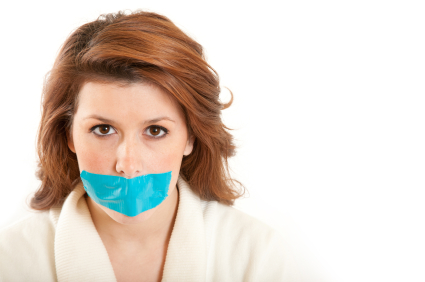 Do not use any negative tone in your follow up letter. Do not go on to tell them of anything that might have irked you during your interview or during your time at their office.
Do not use any negative tone in your follow up letter. Do not go on to tell them of anything that might have irked you during your interview or during your time at their office.
Make it seem like you had a nice time, and focus on the good things about the interview and the company only.
A negative emotion in your letter can paint a bad picture of you as someone who can’t handle minor disturbances in their routine, or as someone who is not willing to adjust to the instances.
8. Avoid cheesy lines:
This is a big no no. never use cheesy lines in your follow up letter. This might give them ample ground to avoid you. If you over do it, they might not even want to hire you on the grounds of this alone.
Another thing to avoid is emoticons and unnecessary exclamation points. This lifts the air of seriousness from the official letter and makes it seem like you are not taking the job seriously.
Do not use exclamation points in your letter, no matter how excited you are about the job you have.
You need to understand that this is a formal letter and should be treated as such, and the language used in it should be befitting.
9. Always use formal language:
Language is very important in a formal letter. Use official tone in your language, and do not let your emotions show.
Keeping the letter to the point and short will help keeping the emotional undertone in check. It is up to you to keep the language formal and one that befits an official letter.
A formal language will keep an air of seriousness intact and will help the recruiters take you more seriously.
10. Check your spelling and grammar:
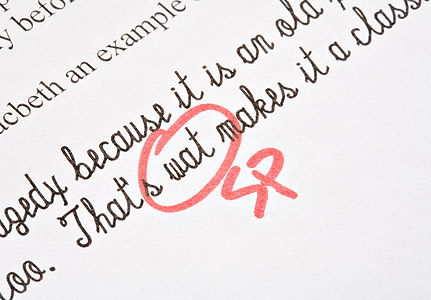 It cannot be stressed enough to check your spelling and grammar. Make sure you double check these elements before you send out the follow up letter.
It cannot be stressed enough to check your spelling and grammar. Make sure you double check these elements before you send out the follow up letter.
A letter riddled with spelling and grammatical errors is a distraction to read and can also make you seem like a careless person.
Spelling and grammar checks have become easier with the use of word processors on computers. It is also advised to have your letter proof read by some one knowledgeable in the language before you send it out.
11. Do not keep contacting them incessantly:
Calling them over and over again will come off as desperate on your part. This can put them off and can even ruin your chances of getting the job even after a good interview.
The follow up is only to make you stand out from the rest of the candidates, irritating the recruiters by dumping multiple mails and calling them with every chance you get will do more harm than good.
12. Do not write it ahead of time:
Never write your thank you note before you even attend the interview. The follow up should be genuinely heartfelt, and you can even customize it to the recruiter by mentioning the details you noticed during the interview.
This will let him/ her know that you are attentive to details and take things seriously. Begin composing it only after the interview is over.
13. Sound enthusiastic about your new job and interview:
Although you are sending a business/ formal mail it must show some sort of enthusiasm you have about the interview, and the job application.
This can be shown by the quality of your letter and by putting this in your letter as well.
14. Address any weaknesses or misunderstandings:
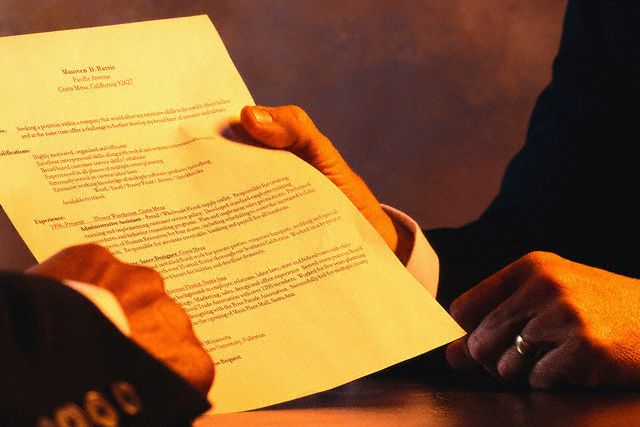 Address any slip-ups you might have made during your interview. Take some time to list out all the mistakes you did, and reasons to why that happened.
Address any slip-ups you might have made during your interview. Take some time to list out all the mistakes you did, and reasons to why that happened.
It can range from illness to sample nervousness. Let the recruiter know why it happened and how you can rectify it.
You can also address any misgivings and your weaknesses. You can also mention how you are looking to rectify them.
15. Always send with suitable thank you note:
The follow up letter must end with a good thank you note. It signifies your gratitude and it should be to the point like everything else in the letter.
The follow up thank you must extend to the recruiter, the bosses and the company for giving you an opportunity to have a wonderful experience.
By following these above mentioned steps, your follow up letter is sure to fall in the right hands. It will improve your chances of standing out from the regular crowd and to get the job you want. Good luck!






























